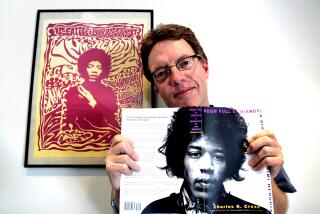CROSSTOWN TRAFFIC Jimi Hendrix and the Post-War Rock-n-Roll Revolution <i> by Charles Shaar Murray (St. Martin’s Press: $18.95; 238 pp.) </i>
- Share via
Rock journalism has long suffered from the fact that many practitioners attempt to emulate their guitar heroes on the written page; they riff, lick, stretch, echo, noodle, and finally solo at ridiculous lengths. Charles Shaar Murray unfortunately shares this trait, with the result that one wishes to send him to writers’ reform school.
“Crosstown Traffic” deals only loosely with Jimi Hendrix; Murray is more interested in the guitarist’s predecessors in soul, jazz and the blues than in Hendrix’s life or even his work. Murray’s approach may have seemed appropriate at one time, a number of serviceable Hendrix biographies having appeared over the years, but the effect is a book without a viable center.
And that’s the second problem with “Crosstown Traffic”: it’s built around Murray’s opinions, which he gives us little reason to trust. Why should we care that he hates the movie “Ferris Bueller’s Day Off,” which has nothing to do with either rock or Jimi Hendrix? (Murray’s reference isn’t even to the star’s lip-synching of “Twist and Shout.”)
The book is littered with such off-the-cuff comments, which read suspiciously like padding. Worst of all, perhaps, Murray’s flippant tone undermines the thoughtful points he makes about modern music in the second half of the book. His chapters on the blues, soul and jazz, for instance, are quite interesting--far better than the earlier chapter on sex as a subject in black music, which bears the adolescent subtitle, “So was Jimi Hendrix a sexist pig or what?”
Murray obviously hopes that his rock writing will be taken seriously, but that’s unlikely; when he discusses the musician’s becoming an overnight sensation in London in 1967, Murray describes Hendrix as “some improbable blend of Julius Caesar and Cinderella.” Teen-agers discovering Hendrix today may well glory in such characterizations, but those of us who followed Hendrix’s music during his lifetime are bound to find them silly.
More to Read
Sign up for our Book Club newsletter
Get the latest news, events and more from the Los Angeles Times Book Club, and help us get L.A. reading and talking.
You may occasionally receive promotional content from the Los Angeles Times.







